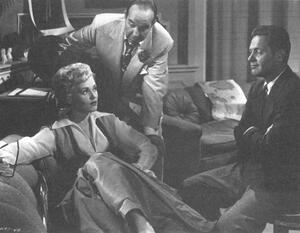Judy Holliday Wins Academy Award for Best Actress
Bette Davis, Gloria Swanson, and Anne Baxter were all in the running. When the Academy Award for best actress was announced on March 29, 1951, however, the Oscar went to young comedian Judy Holliday, for her performance as Billie Dawn in Born Yesterday. Holliday had created the Billie Dawn role on Broadway in 1946. On both stage and screen, Holliday played the ex-showgirl girlfriend of a corrupt tycoon who is trying to mold her to his will. In the end, Holliday's seemingly dumb-blonde character manages to overturn her boyfriend's plot to corrupt the federal government. The New York Times called her performance "not only funny but also human and moving."
Holliday's acting career was brief but impressive. Born in 1921, she grew up in New York City. She was brought up mainly within her mother's extended and socialist-leaning family. Her father was an active Zionist leader as well as the president of the American Federation of Musicians from 1929 to 1937.
After graduating at the top of her class at the Julia Richman High School, she got her start in the theater as a member of the Revuers, a group that played clubs in New York's Greenwich Village. Betty Comden and Adolph Green, who would go on to great fame as a musical-comedy writing team, were also members of the troupe. Holliday's first Broadway role was as a prostitute in Kiss Them for Me (1945), for which she won the Clarence Derwent Award for best supporting actress. During this period, Hollywood producers convinced the actress to change her last name from Tuvim. She chose Holliday because of its relationship to holy days, one of the Hebrew meanings of Tuvim.
Despite her success on stage in Born Yesterday, Harry Cohn, the producer of the film version, wanted to find a more glamorous and well-known star for the movie role, reputedly dismissing Holliday as "that fat Jewish broad." The efforts of director George Cukor and stars Katherine Hepburn and Spencer Tracey to spotlight the young actress in a supporting role in Adam's Rib (1949) finally convinced Cohn of Holliday's marketability.
One year after receiving her Academy Award, Holliday got caught up in the McCarthy-era investigations of Hollywood and was subpoenaed to testify before the Senate Internal Security subcommittee in 1952. Transcripts reveal that she used her "dumb blonde" persona to deflect the committee's attempts to implicate her or get her to name names. She was not accused of being a Communist, but the taint of the investigation kept her off of television and radio for a number of years. Holliday's contract with Columbia studios continued, however, and she appeared in a series of films including The Marrying Kind (1952) and It Should Happen to You (1954). Holliday returned to Broadway in 1956 in the hit musical Bells are Ringing, written by her friends Betty Comden and Arthur Green, with music by Comden, Green, and Jules Styne, and directed by Jerome Robbins. Holliday played a wish-fulfilling telephone operator, a role for which she earned the New York Drama Desk Award and the Tony Award (chosen over Ethel Merman and Julie Andrews). Holliday also starred in the film version of the musical in 1960.
A diagnosis of breast cancer in 1960 limited Holliday's future work. She died in 1965, at age 43.
Sources: Gary Carey, Judy Holliday: An Intimate Life Story (New York, 1982); William Holtzman, Judy Holliday (New York, 1982); Jewish Women in America: An Historical Encyclopedia, pp. 647-649; New York Times, March 30, 1951, June 8, 1965; The Judy Holliday Resource Center: www.wtv-zone.com/lumina/judy/main.html.




Thanks for remembering Judy. One of the greatest.
Interesting stuff this is. Find this article really useful to me.
I like this great one blog post.